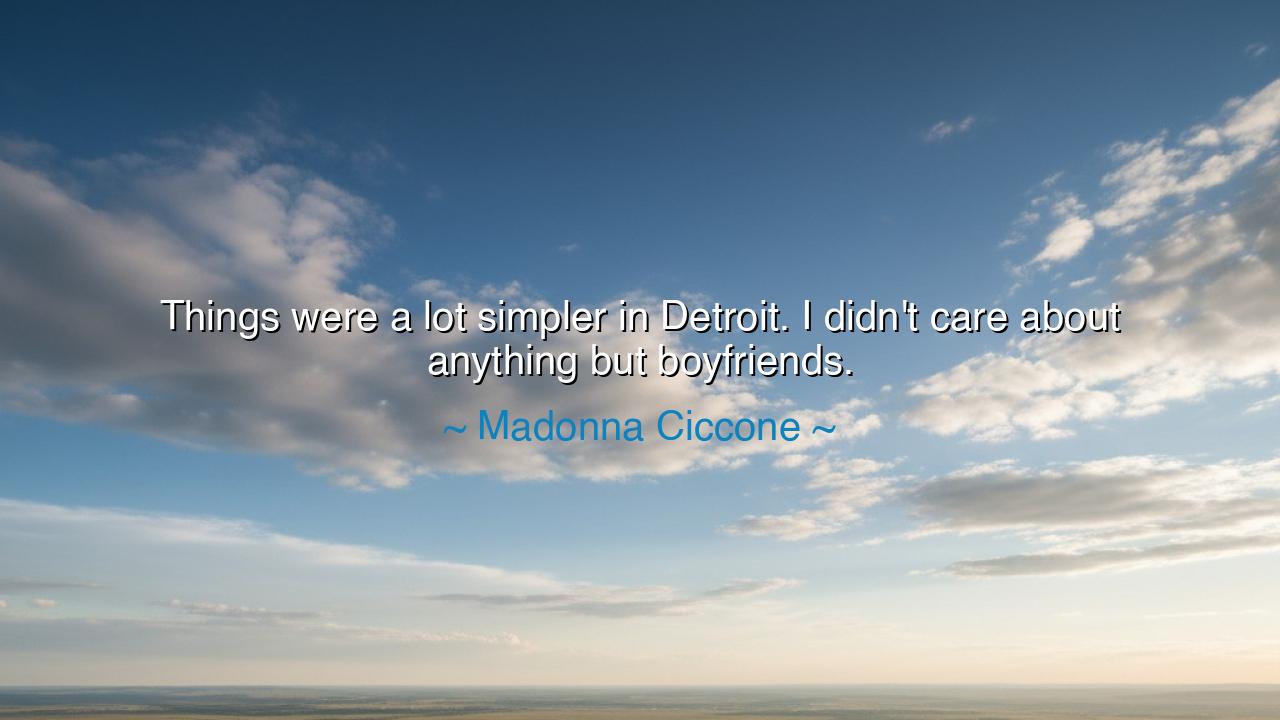
Things were a lot simpler in Detroit. I didn't care about






When Madonna Ciccone spoke the words, “Things were a lot simpler in Detroit. I didn’t care about anything but boyfriends,” she was not merely reminiscing on youth — she was reflecting upon the eternal transformation of innocence into awareness, of simplicity into ambition. Beneath her lightness lies the sigh of all who have grown beyond their beginnings. In these few words lives a universe of meaning: the ache of nostalgia, the loss of simplicity, and the awakening of a soul destined for more. For every great spirit begins in smallness — not in glory, but in the quiet pulse of an ordinary life.
To say, “Things were a lot simpler in Detroit,” is to speak of a time when the world was still narrow, when the heart’s desires were close at hand and uncomplicated. Detroit, the city of her youth, becomes a symbol of innocence — the early garden before the storm of fame, fortune, and expectation. In those days, her concerns were not for art, legacy, or destiny, but for the simple matters of affection, belonging, and self-discovery. The boyfriends she mentions are not trivialities; they are metaphors for youthful passion — the raw, unshaped energy that first teaches us to feel, to hope, to chase something beyond ourselves.
Yet, from that simplicity, the seed of transformation was already taking root. The young girl of Detroit would become Madonna, the woman who redefined music, rebellion, and identity itself. Her reflection, then, is tinged with both irony and wisdom: though she once “didn’t care about anything but boyfriends,” that same fire of feeling would one day become her greatest gift — her ability to love, to provoke, to express. For those who feel deeply in youth often learn, later, to channel that same passion into creation. What was once naive becomes divine.
This journey mirrors that of countless heroes and thinkers. St. Augustine, in his Confessions, spoke of his own youthful pursuits — pleasures that once ruled his life but later became the ground from which understanding grew. “Late have I loved Thee,” he wrote, mourning the years lost to folly, yet recognizing that those very follies were the path that led him to truth. So it is with Madonna’s words. Her simplicity was not error, but preparation. The heart that once chased fleeting love learned to chase purpose, to command the stage, to speak to millions. Her Detroit was the soil from which her legend would bloom.
There is, too, a kind of sorrow in her reflection — a recognition that simplicity is a paradise we can never return to. The woman who conquered the world looks back at the girl who wanted only love, and for a moment, envies her peace. For fame, though radiant, demands the soul’s constant vigilance. The young dreamer, untouched by expectation, moves through life freely; the icon, burdened by her own myth, must measure every step. Thus, her quote becomes both confession and longing — a reminder that progress always asks a price, and that even success cannot buy back the innocence of an unguarded heart.
But this longing is not defeat. It is wisdom. To remember one’s beginning with tenderness is to remain human in the midst of power. Madonna’s reflection is a map for the seeker: never despise the simplicity of your early dreams. The passions that once seemed small or foolish may yet contain the essence of your destiny. For all greatness begins in feeling — in caring deeply about something, even if it seems trivial to others. The young woman who cared only for love learned through it how to understand herself, and through that understanding, how to shape the world.
So let this teaching be carried forward: honor your beginnings, and do not mourn the days when life was simpler. Each stage of the soul serves its purpose. There is beauty in innocence, power in ambition, and wisdom in reflection. The child of Detroit who loved easily became the woman who loved fiercely — and in that transformation lies the path of every soul. You may outgrow your simplicity, but never the heart that first made you dream. For it is that heart — unguarded, curious, and alive — that will forever remind you who you were before the world demanded you become someone else.






AAdministratorAdministrator
Welcome, honored guests. Please leave a comment, we will respond soon